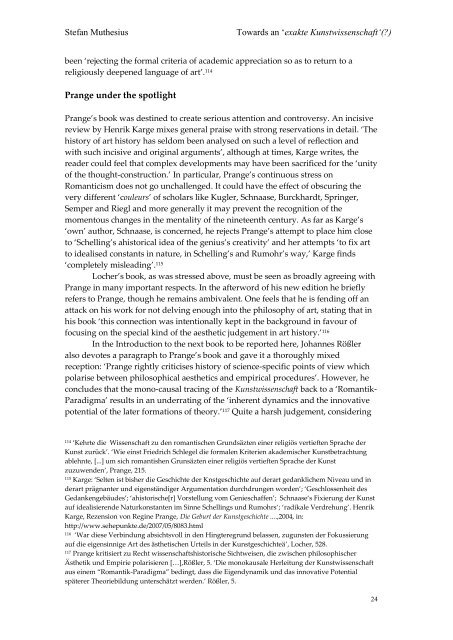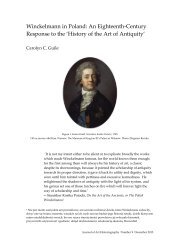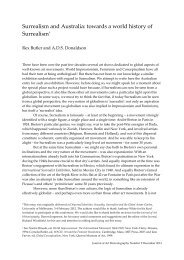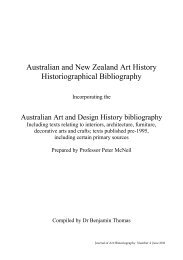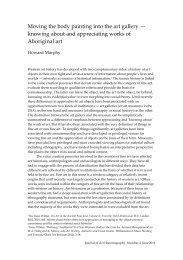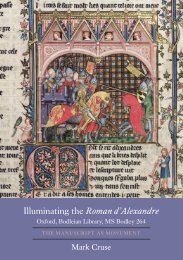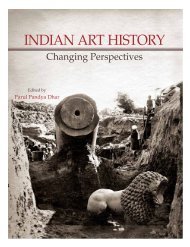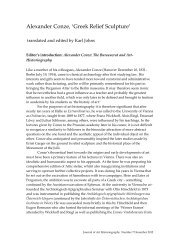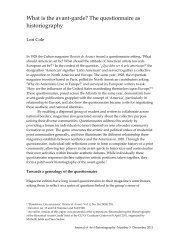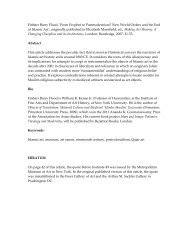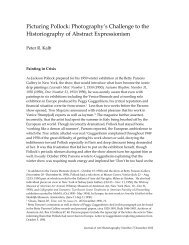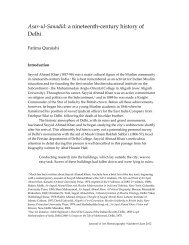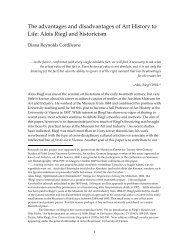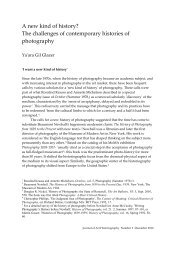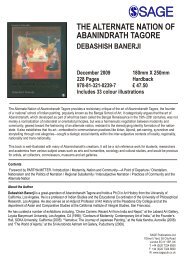9/SM1 - Journal of Art Historiography
9/SM1 - Journal of Art Historiography
9/SM1 - Journal of Art Historiography
Create successful ePaper yourself
Turn your PDF publications into a flip-book with our unique Google optimized e-Paper software.
Stefan Muthesius<br />
Towards an ‘exakte Kunstwissenschaft‘(?)<br />
been ‘rejecting the formal criteria <strong>of</strong> academic appreciation so as to return to a<br />
religiously deepened language <strong>of</strong> art’. 114<br />
Prange under the spotlight<br />
Prange’s book was destined to create serious attention and controversy. An incisive<br />
review by Henrik Karge mixes general praise with strong reservations in detail. ‘The<br />
history <strong>of</strong> art history has seldom been analysed on such a level <strong>of</strong> reflection and<br />
with such incisive and original arguments’, although at times, Karge writes, the<br />
reader could feel that complex developments may have been sacrificed for the ‘unity<br />
<strong>of</strong> the thought-construction.’ In particular, Prange’s continuous stress on<br />
Romanticism does not go unchallenged. It could have the effect <strong>of</strong> obscuring the<br />
very different ‘couleurs’ <strong>of</strong> scholars like Kugler, Schnaase, Burckhardt, Springer,<br />
Semper and Riegl and more generally it may prevent the recognition <strong>of</strong> the<br />
momentous changes in the mentality <strong>of</strong> the nineteenth century. As far as Karge’s<br />
‘own’ author, Schnaase, is concerned, he rejects Prange’s attempt to place him close<br />
to ‘Schelling’s ahistorical idea <strong>of</strong> the genius’s creativity’ and her attempts ‘to fix art<br />
to idealised constants in nature, in Schelling’s and Rumohr’s way,’ Karge finds<br />
‘completely misleading’. 115<br />
Locher’s book, as was stressed above, must be seen as broadly agreeing with<br />
Prange in many important respects. In the afterword <strong>of</strong> his new edition he briefly<br />
refers to Prange, though he remains ambivalent. One feels that he is fending <strong>of</strong>f an<br />
attack on his work for not delving enough into the philosophy <strong>of</strong> art, stating that in<br />
his book ‘this connection was intentionally kept in the background in favour <strong>of</strong><br />
focusing on the special kind <strong>of</strong> the aesthetic judgement in art history.’ 116<br />
In the Introduction to the next book to be reported here, Johannes Rößler<br />
also devotes a paragraph to Prange’s book and gave it a thoroughly mixed<br />
reception: ‘Prange rightly criticises history <strong>of</strong> science-specific points <strong>of</strong> view which<br />
polarise between philosophical aesthetics and empirical procedures’. However, he<br />
concludes that the mono-causal tracing <strong>of</strong> the Kunstwissenschaft back to a ‘Romantik-<br />
Paradigma’ results in an underrating <strong>of</strong> the ‘inherent dynamics and the innovative<br />
potential <strong>of</strong> the later formations <strong>of</strong> theory.’ 117 Quite a harsh judgement, considering<br />
114<br />
‘Kehrte die Wissenschaft zu den romantischen Grundsäzten einer religiös vertieften Sprache der<br />
Kunst zurück’. ‘Wie einst Friedrich Schlegel die formalen Kriterien akademischer Kunstbetrachtung<br />
ablehnte, [...] um sich romantishen Grunsäzten einer religiös vertieften Sprache der Kunst<br />
zuzuwenden’, Prange, 215.<br />
115<br />
Karge: ‘Selten ist bisher die Geschichte der Knstgeschichte auf derart gedanklichem Niveau und in<br />
derart prägnanter und eigenständiger Argumentation durchdrungen worden’; ‘Geschlossenheit des<br />
Gedankengebäudes’; ‘ahistorische[r] Vorstellung vom Genieschaffen’; Schnaase‘s Fixierung der Kunst<br />
auf idealisierende Naturkonstanten im Sinne Schellings und Rumohrs‘; ‘radikale Verdrehung’. Henrik<br />
Karge, Rezension von Regine Prange, Die Geburt der Kunstgeschichte ....,2004, in:<br />
http://www.sehepunkte.de/2007/05/8083.html<br />
116<br />
‘War diese Verbindung absichtsvoll in den Hingteregrund belassen, zugunsten der Fokussierung<br />
auf die eigensinnige <strong>Art</strong> des ästhetischen Urteils in der Kunstgeschichteä’, Locher, 528.<br />
117<br />
Prange kritisiert zu Recht wissenschaftshistorische Sichtweisen, die zwischen philosophischer<br />
Ästhetik und Empirie polarisieren […],Rößler, 5. ‘Die monokausale Herleitung der Kunstwissenschaft<br />
aus einem “Romantik-Paradigma” bedingt, dass die Eigendynamik und das innovative Potential<br />
späterer Theoriebildung unterschätzt werden.’ Rößler, 5.<br />
24


